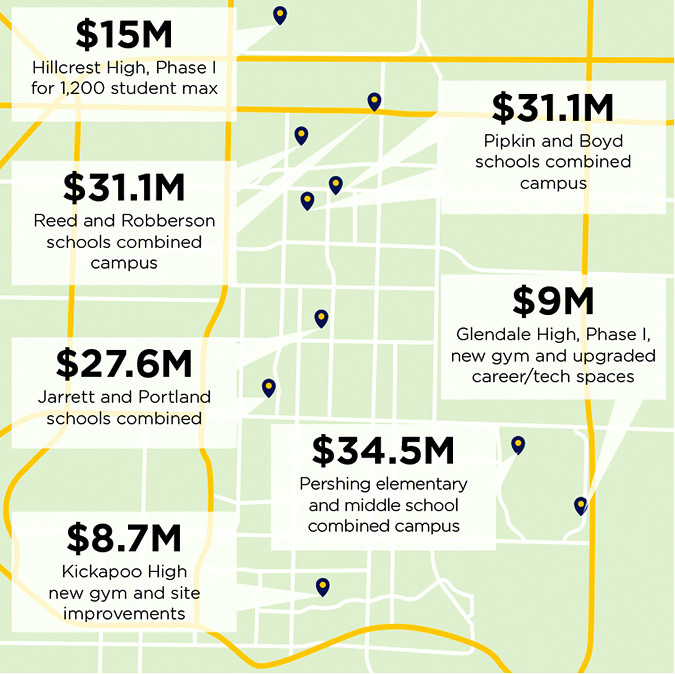Springfield Public Schools’ $189 million bond proposal is causing concerned citizens to rally.
On one side of the issue is the Save R-12 Schools Committee comprising a handful of former SPS teachers and board members who argue that substance is more important than appearance and academic success is not determined by facilities. On the other side is Quality Schools for Kids, a campaign committee led by businesspeople organized to advocate for the proposal’s passage as an investment in the future.
Voters will decide April 4 whether to approve a 24-cent increase to the debt-service levy that will be phased in over two years and fund construction of several new elementary and middle schools.
Organizers of Save R-12 Schools held a news conference last month at the DoubleTree Hotel to outline five points of opposition.
“We are not in denial that some building conditions are unacceptable and need remediation,” said Virgil Hill, the committee’s chairman and spokesman. “We believe that the wise and sustainable course of action is to repair, rehab and renovate, where necessary, but don’t generally replace.”
Among the committee’s concerns are the tax increase; lack of relationship between the newness of facilities and academic performance; adverse neighborhood impacts; and an emphasis on valuing buildings over teachers. Opponents say the “scale, scope and sweep” of the proposal would negatively impact resource allocation and eliminate alternatives.
“No rational homeowner confronted with a clogged toilet or a leaky roof would conclude that only replacing the whole house would suffice as a remedy,” Hill said.
Michael Sapp’s architecture firm, Sapp Design Associates LLC, has experience designing schools in the so-called 21st century learning model, including the recent Sherwood Elementary for SPS, Nixa’s Junior High and Joplin’s post-tornado Irving Elementary. Sapp travels the country for such projects and has often questioned why SPS’ proposed bond issues are significantly smaller than districts he’s worked for a quarter the size of Springfield.
“I think the reason why this is such a big monetary amount is because we’ve taken mini steps. We haven’t taken appropriate steps along the way to always stay current,” he said during a recent CEO Roundtable interview with Springfield Business Journal. “You can argue both sides.”
Most recently, Springfield voters approved a $72 million bond issue in 2013 and a no-tax-increase bond issue that leveraged federal stimulus money resulting in $50 million in school improvements. The 2013 bond issue also faced opposition, coming from nonprofit advocacy group Minorities in Business, which cited a lack of SPS project contracts going to minority-owned businesses.
Acknowledging his firm and other architects would be in line for a big boost in work, Sapp said the profession recognizes that as the teaching model changes to project-based learning, buildings must adapt.
“Today, there’s tests that prove it: that the success of a child’s learning capabilities and test scores can be directly linked to the quality of architecture and the environment that they’re in, as well as teachers who work in those environments,” he said.
A different building model can allow for the ease of co-teaching or bringing classes together at a moment’s notice, he said. For instance, furniture can be rearranged in 10 minutes to allow for specialized project learning exercises.
While the debate continues, Sapp gives credence to the district’s long-range planning.
“In that long-range plan, they involved the community extensively,” he said. “Ultimately their response with the master plan is a response to the community and what they said.”
SPS hired Tallahassee, Florida-based MGT of America Inc. to complete a facilities study, which recommended the 12-year, $367.6 million facility master plan to be conducted in two phases.
In his response to the opposition, Superintendent John Jungmann noted Proposition SPS was unanimously supported by the Springfield board of education and was the result of a yearlong process involving thousands of community members, including SPS students, parents and employees.
“Their input validated that quality schools are important to this community, and that Springfield is willing to invest in its students, teachers and schools. Community input also helped us identify schools with the most critical needs, which will be addressed by this investment,” Jungmann said in a statement to SBJ, which also noted the plan would impact 19 schools and expand early childhood education with $4 million for additional classes.
Hill contested the MGT report was “carefully calculated to satisfy the client,” and he cited building condition scores MGT assigned to certain schools. The Save R-12 Schools Committee’s review of SPS and Missouri Department of Elementary and Secondary Education data found schools with higher building condition scores – such as Hickory Hills’ 94 score – do not perform more proficiently than schools with lower scores, such as 68 at Pleasant View.
Construction of new schools, Hill said, is a solution that looks good on the surface but does not address key issues affecting students.
“Constructing new buildings is easy. Holding a shovel to break ground in a photo-op is easy. Those things give the impression of activity and improvement,” he said. “Adopting and implementing a rigorous, high-expectations curriculum is hard.
“Recruiting, developing and retaining a corps of superb principals and teachers is hard.”
The Save R-12 Schools Committee – comprising Steve Hoots, Carl Herd, Fred Ellison, Ralph Plank and David Awbrey – also was involved in bringing about a 2012 state audit that was highly critical of the SPS district.
Members of the Quality Schools for Kids committee include co-chairs Stephanie Stenger Montgomery and Jim Anderson, along with Jack Stack, Tim O’Reilly, Matt and Emily Gifford, Cheryl Clay, Gordon Kinne, Denise Fredrick, Sara Lampe, Terri West McQueary, Wes Pratt and Tim Rosenbury.
